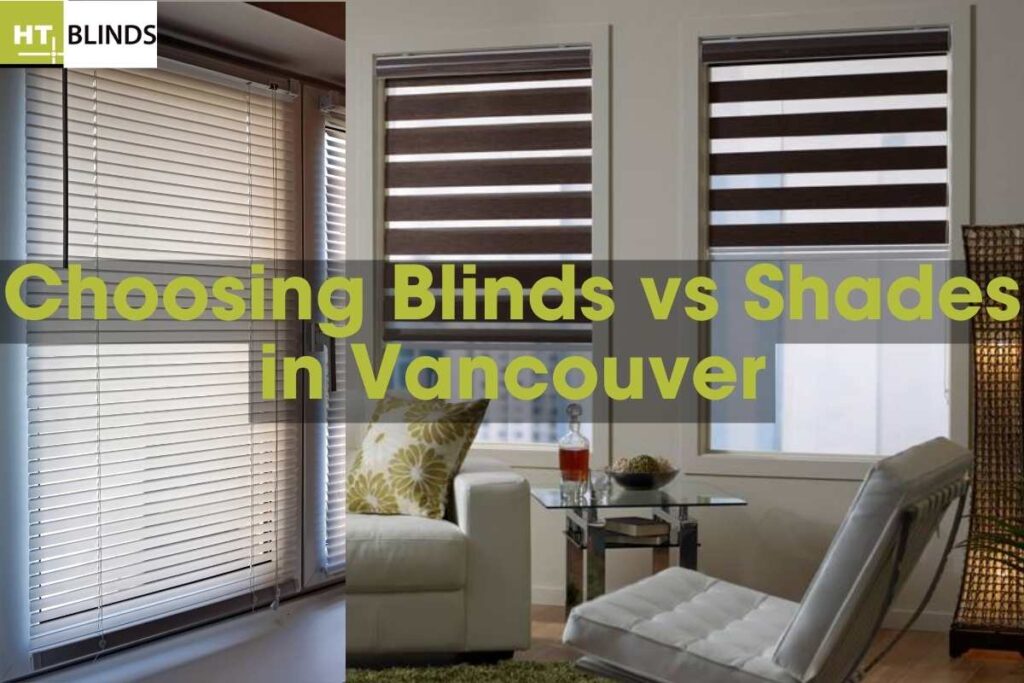Window treatments can improve your home’s atmosphere. The variety of blinds and shades in cosmopolitan Vancouver might be daunting. Use this page to learn about blinds and shades, Vancouverites’ needs, and more to choose for your home. HT Blinds Window blinds impact privacy, light, and mood in urban Vancouver. Blinds and shades impact energy costs, comfort, and furniture durability. Window treatments should balance form and function, not just flair. Blinds or shades can affect your home’s comfort, energy efficiency, and visual appeal in Vancouver, a city noted for its distinctive architecture and environment. The pros and disadvantages of each option are examined in this guide to help you choose and build a welcoming and functional living area. High rise blinds manufacturers specialize in durable, high-performance window treatments designed for tall buildings.
Understanding Shades and Blinds
Be attentive while buying window coverings for design and function. Blinds and shades can improve energy efficiency, comfort, and curb appeal in Vancouver, recognized for its diverse climate and unique architecture. Pros and drawbacks will help you choose a home improvement method to make it more enjoyable and functional. Weather, architecture, and personal preferences should be considered while selecting Vancouver blinds and shades.
What’s Blind?
Slatted blinds can be tilted open or closed to control light and privacy. Their materials are usually wood, metal, or vinyl.
What are shades?
Continuous cloth shades are soft window coverings. Shades cannot be altered for light levels, unlike blinds. Common shades:
Roller shades are one piece of fabric that rolls. Roller blinds are famous for their simplicity, versatility, and clean lines. Zebra blinds in West Vancouver are a popular choice for homeowners seeking a contemporary window treatment solution.
Roman shades: Folds smoothly when raised. Any space looks classier with roman shades. Flat, hobbled, and relaxed styles give varied looks when the shade is raised. Roman shades can be manufactured from light-filtering or blackout textiles.
Honeycomb blinds, or cellular shades, trap air for insulation. Cellular blinds are energy-efficient and ideal for Vancouver’s diverse environment. Honeycomb cells trap air, regulating indoor temperatures and lowering energy expenditures.
Pleated Shades: Cellular shades without honeycomb structure. Crisp, accordion-like folds give pleated shades a modern appeal. Leading zebra blinds manufacturers offer innovative designs that combine sheer and solid fabrics for versatile light control.
Considerations for Blinds vs. Shades
Light management, privacy, insulation, and aesthetics must be considered while choosing window treatments. These elements can greatly affect your home’s comfort and functionality, especially in Vancouver’s distinctive climate and urban setting. Consider these factors while choosing blinds or shades:
Lighting Control: Vancouver has bright and cloudy days. The adjustable slats of blinds provide for additional light control. Tilting the slats lets in light while keeping seclusion. However, shades block all light while closed and filter light differently when open, depending on material and design.
Privacy: Blinds and shades provide privacy to varying degrees. Adjusting blind slats lets you look outside without sacrificing privacy. Closed shades provide complete privacy but reduce natural light.
Energy Efficiency and Insulation: Vancouver homes need good insulation to stay warm in winter and cool in summer. Cellular blinds’ honeycomb structure traps air and insulates against temperature variations.
Cosmetic Appeal: Blinds and shades greatly affect your home’s appeal. Blinds are more rigid and modern, while shades are softer and more graceful. Consider how window treatments will match your home’s style. Window blinds in Richmond come in a variety of styles and materials, perfect for any home decor.
Blinds vs. Shades: Pros/Cons
Learn the pros and drawbacks of blinds and shades to choose one that suits your needs and enhances your home. Pros and drawbacks of each option:
Pros of Blinds
- Adjustable slats perfectly manage light and privacy. Tilting the slats lets light in while maintaining privacy.
- Durability: Wood, metal, and vinyl blinds last. They last longer than fabric blinds and can be used daily.
- Variety: Blinds match decor with different styles, colors, and finishes. Natural wood, sleek metal, or versatile vinyl can match your style and home’s design.
Blind Drawbacks
- Blinds lack insulation compared to cellular shades. They reduce summer heat gain and winter heat loss less than insulated blinds.
- Blinds may be tougher to adjust than shades. Slats adjust light and privacy slower than shades.
- Slats may click in breezes. This may worry those who reside in windy areas or prefer peaceful homes.
- Shades give your home a softer, more uniform look. Customize them with fabrics, colors, and patterns to match your decor.
- Insulated cellular blinds minimize energy costs and preserve indoor temperatures. Honeycombs trap air, reducing temperature changes.
- Sheer hues filter light well, creating a cozy atmosphere. Sheer shades combine blind functionality with fabric softness for natural light and privacy.
- Variety of Fabrics: You may modify your home’s decor with shades’ different colors, patterns, and textures.
Shades’ drawbacks
- Open or closed shades cannot be adjusted for partial light. This is a limitation for precise daytime light adjusting.
- Fabric blinds are harder to clean and may accumulate allergies. Cleaning and upkeep may outnumber blinds.
- Shades may wear out faster than blinds in high-traffic areas. In direct sunlight or frequent use, fabric shades can wear out.
Install and Maintain
Correct installation and maintenance will keep your window coverings looking and working properly for years. Tips for installation and maintenance:
Tips for Installation
Accurate measurements are essential for a perfect fit. For exact measurements, follow HT Blinds manufacturer instructions or employ an expert. Poor measurements can cause window treatments to fit poorly, causing gaps, poor operation, and an ugly appearance.
Options for mounting: Choose interior or exterior mounts. Outside mounts make windows look bigger, while inside mounts look cleaner. Each choice has merits, so consider your preferences and window qualities while choosing.
Some window treatments can be installed oneself, while others require expert installation. Consider complexity and skill level before choosing. Professional installation ensures a flawless fit and proper operation, especially for bigger or more sophisticated window treatments. If you’re looking for energy-efficient window coverings, HT Blinds roller shades in Burnaby provide excellent insulation and light control.
Maintenance Tips
Regular Cleaning: Dust blinds with microfiber cloth or duster. Vacuum shades using a brush. Keep your window coverings clean to maintain their beauty and performance.
Deep Cleaning: Follow manufacturer directions for further cleaning. Blinds may need removal and washing, while cloth shades may need spot cleaning or expert cleaning. Window treatments can last longer and look better with regular deep cleaning.
Repairs: Fix problems quickly to retain functionality. Slats and fabric should be replaced as needed. Keep your window treatments in good condition to keep them working and looking attractive.
Conclusion
Vancouver blinds and shades should be chosen based on light management, privacy, insulation, aesthetics, and climate. By considering the advantages and cons of each option and your needs, you can make a choice that improves your home’s comfort and beauty. Spend time reviewing samples, talking with professionals, and researching eco-friendly solutions to ensure your window treatments match your functional demands and lifestyle and values. You’ll enjoy years of comfort, energy efficiency, and aesthetic appeal in your Vancouver home with the proper option.


